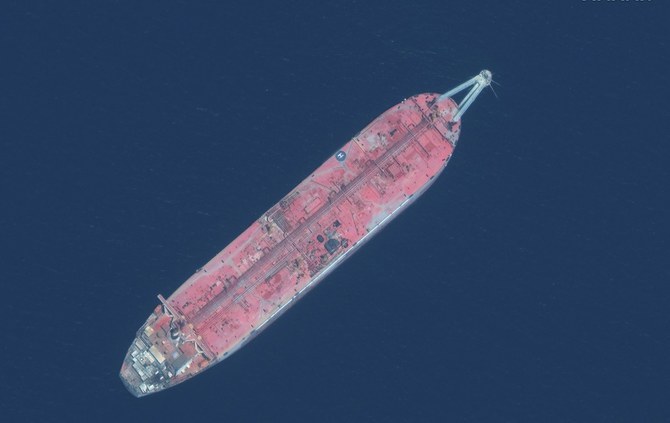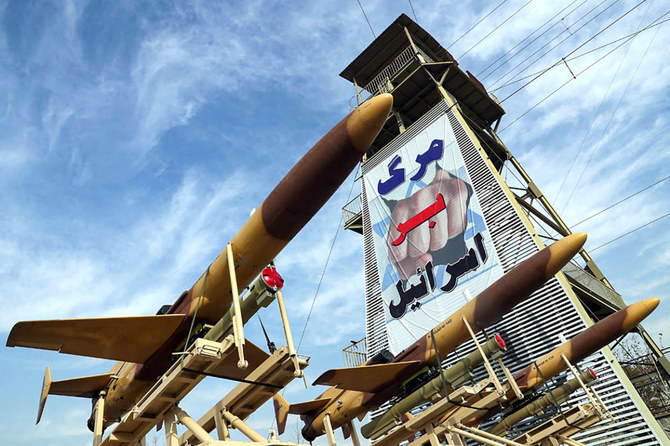Ephrem Kossaify
NEW YORK: The UN on Monday launched a social media campaign to raise money to bridge the gap in funding for a salvage operation to prevent a potentially devastating oil spill in the Red Sea from the decaying tanker FSO Safer.
The vessel, which contains 48 million gallons of oil, has been moored off the west cost of Yemen since the start of the war in the country seven years ago. It has had little or no maintenance during that time and its condition has deteriorated, raising growing fears that a disaster is imminent that could cause the world’s fifth-largest oil spill from a tanker.
The UN is seeking $144 million in donations to fund the operation to make it safe, $80 million of which will be used to transfer the oil to another vessel.
“Following Saudi Arabia’s announcement of a $10 million pledge on June 12 and the US announcement that it is working toward a $10 million contribution, we now have three-quarters of the $80 million required to start the emergency phase of the operation,” said UN spokesperson Stephane Dujarric.
David Gressly, the UN’s resident and humanitarian coordinator for Yemen, announced the fundraiser in a message posted to his Twitter account. He said the goal is to raise $5 million by June 30 so that work on the vessel can begin in July.
The Safer, a floating storage and offloading terminal, is anchored close to the Yemeni port of Hodeidah. The rusting vessel’s hull, equipment and systems have deteriorated so badly that there are growing fears it could spring a leak, catch fire or even explode, potentially causing an environmental disaster four times worse than the Exxon Valdez spill off the coast of Alaska in 1989, which remains the world’s worst in terms of damage to the environment.
Since 2019, the UN has been calling on the Houthis to allow a team of experts to access the ship, assess its condition and conduct emergency repairs, warning that a leak would destroy the livelihoods of many Yemenis, damage marine life and disrupt deliveries of aid. It could also disrupt commercial shipping in the Red Sea, which is one of the world’s busiest waterways and accounts for 10 percent of global trade.
Other countries along its coast could also be affected, including Saudi Arabia, Djibouti and Eritrea. In November last year, the Houthis agreed to grant access to the ship.
Early this month, Linda Thomas-Greenfield, the permanent US representative to the UN, said: “We know what the consequences are, we know the danger that is there and we have encouraged others to contribute to the funding of this effort.
“But let’s be clear the problem with the Safer is the Houthis, who have not allowed even the UN or others (to access the ship and inspect it).”
She said the ultimate responsibility rests with the militia because: “We can get all the money in the world and if they don’t allow access then we’re still in the same place where we started. So it is a two-pronged effort to get this done.”
Asked by Arab News whether or not he feels confident the Houthis will stand by their agreement to allow UN experts to board the vessel, Dujarric said: “In Yemen, as everywhere else around the world, we take things one day at a time.
“But our understanding is that, yes, we will have the access to the ship, which is critical for us in order to avoid what we fear would be an ecological disaster.”
Meanwhile, Hans Grundberg, the UN’s special envoy for Yemen, said he is expecting an imminent response from the Houthis to a proposal for the phased reopening of key roads in Taiz and other governorates.
“The UN proposal takes into consideration various concerns expressed by both sides during discussions that started in the Jordanian capital, Amman, last month,” said Dujarric.
Taiz governorate has been under siege since 2015, when the Houthis closed main routes and surrounded the city center, largely cutting it off from the rest of the country. The siege continues despite the recent extension of a truce between the militia and government forces.
“As with all elements of the truce, the opening of roads is a measure to alleviate the suffering of Yemenis, as well as to bring about some sense of normalization and facilitate freedom of movement for Yemeni civilians,” said Grundberg.






















